|
This is my summary of learning for the course! I made mine on PowerPoint, with recorded audio - which is new to me! Unfortunately, the audio doesn't work on Scribd documents, so I had to add it as a downloadable file at the bottom. I learned so so much this semester that I will take into my classrooms everyday!
0 Comments
As the semester ends, I would like to reflect on my course contribution this year! Firstly, in my other courses (specifically ECS 102), I often brought up topics that were discussed in this class. I found myself thinking a lot about online presence and literacy and talked about it a lot! Although this class was in person, so screenshots were not an options – I do remember specifically bringing up cyber vigilantism when talking about how teaching need to be professional all the time and realizing that teachers really need to be professional their entire lives, or something from the past can be brought up against them! I also taught my siblings more about digital literacy, as they often believe everything they see online! This helped them not be so gullible – or maybe they just don’t tell me all their weird new findings anymore! Throughout the semester, I also commented on other students’ blog posts and responded thoughtfully to what they posted about! I learned more sources and blogging styles through other blogs. This community of class blogs was very helpful through the semester, and I enjoyed supporting each other in our learning projects! In breakout rooms, I participated every time and often spoke for my group when the class came together to discuss various topics. I enjoyed meeting with other students in groups and face-to-face! Often, when these topics were talked through, we would discuss personal matters and how these topics relate to our real lives – which I loved! Overall, the course community was kind and responsive whenever I reached out! Thanks for a great semester! 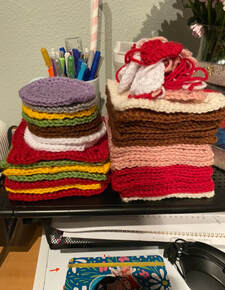 As the year comes to an end, it is time to wrap up my learning project. Learning how to crochet has been a very very fun assignment, and I am glad I got this experience to try learning more about one of my own passions and hobbies – and excuse it as homework LOL. I also feel like I have more confidence to show everyone what I have made and tell them about my hobby, instead of hiding it all in my room where no one will ever see it! This journey has definitely taught me a lot about crochet, but also a lot about art and how to celebrate the progress I make! In the beginning I chose to improve my crochet skills and knowledge because I wanted to make a baby blanket for my brothers baby that will be born in August. This assignment gave me time to work on that blanket guilt-free and allowed me to improve my skills and find tools to advance quickly. I used many different online tools to learn these skills including YouTube, Instagram, TikTok, and several other blogs from students. I also used many different tools to share my learning including Notability, iMovie, SpeedEditor, and Photos. Learning Project Recap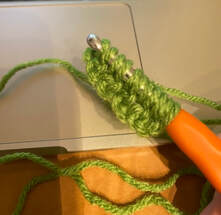 Week 1: Got Me Hooked: Introducing My Learning Project To start this project off, I wanted to set clear goals and reflect on why I was passionate about crochet in the first place. This was also my first attempt at blogging anything, or even being casual in an assignment at all!
Week 2: Learning Through Viewing The first step I took was finding a tutorial online to start off this baby blanket! I wasn’t sure what I wanted it to look like, but found this very cute tutorial online to follow!
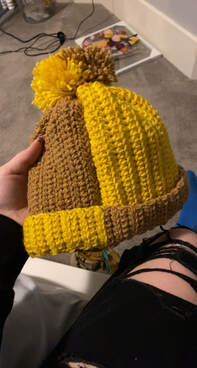 Week 3: Learning Through Language This week, I tried to follow a typed pattern for a heart pillow, but after many attempts, I was unsuccessful. I wasn’t ready for the pattern reading I was working towards, so switched up my plan to an easier one.
Week 4: 'Directing' the Classroom This week was a combination week of our technology post with our learning project post! I tried out iMovie to update my learning project, which was not so bad!
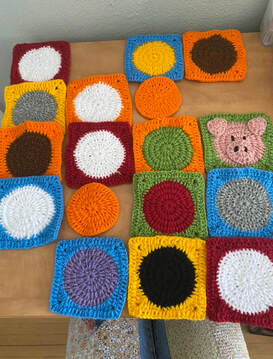 Week 5: Crochet Away This post was made over our school break, which gave me lots of time to sit down and work on my projects! I completed many projects with help of motivation from online sources.
Week 6: Slowing Progress… This week went by slowly, as I had to get back to school and do homework and study (borrringgg). It felt very unproductive in comparison to my previous week, but I still worked on my pattern for my baby blanket!
Week 7: Crochet Bouquet!! This week I made something that I LOVE! Two of my favourite things, flowers and crochet came together (by me!) and now decorate my room beautifully!
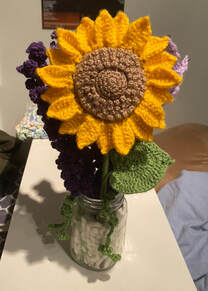 Week 8: Growing Flowers and Minds This week has to be my favourite week, although I do love all the work I’ve done. This week was impactful, and changed my mind about the things that I make, and this realization really changed my assignment mindset back into an open and excited mindset!
Week 9: Hopping to the Finish Line This week I decided to make a pattern using all of my knowledge I’ve learned so far. This pattern is for something I am working on, but have no finished yet!
Week 10: Reusing Yarn, Reducing Sweaters and Recycling Ideas! This week I took apart an old sweater that did not fit, and used the yarn for new projects.
What I learned This past semester, I have really learned a lot about crochet! Through many different sources, I learned many different things. Looking back at my original goals, I think I reached them for the most part! Although I did not follow the timeline I had originally set, and ended up making way more items than I had planned – I think I surpassed my goals for this learning project, and am walking away with more knowledge than I even knew was possible! Online Learning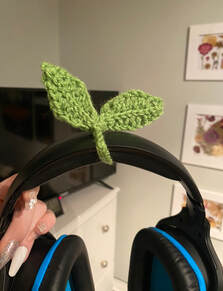 This Learning Project journey has really inspired me in many ways. I find myself using the internet for helpful things, like learning about everything that I can instead of mindless scrolling a lot more. Through these ten weeks, I have reflected greatly on my online presence and my use of the internet. Although I have often been one to hate on social media and our dependence on the internet, I have a new found appreciation for everything online. I am glad that I can see what other people are making, doing and excited about in their lives, and I am glad that people have this outlet to express themselves in many ways! Overall, for myself, I found that learning through videos with visual and verbal instructions were the best support for myself. Once I started to learn more, the written and chart patterns became easy to understand, but did not necessarily teach me anything new after my first time. With this understanding, as a future teacher and our use of technology – I know more about how I could help support students through the screen, instead of what I previously thought (I thought typing an email would suffice, and maybe it would for some students – but not all). I think I discovered that learning online is much easier than I expected! Perhaps, if I wanted to learn something more obscure and specific, it wouldn’t be as easy, but the amount of sources I found for crochet was insane! I preferred the videos, but there were many other forms of teaching that I didn’t like as much, like written patterns, chart patterns, audio only, visual only. And many different creators sharing these through social media, blogs, websites, or selling them! It seems that learning online has never been easier or more accessible than it is today! 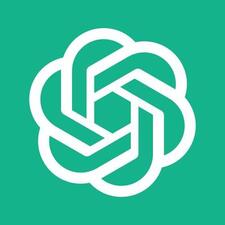 This week, we looked into AI generator tools and their relationship to education. Growing up, while AI was just becoming a reality, I was taught to be afraid of it and to stay away from using anything with AI. Today, AI is celebrated and brought into every social media and website for our use without us even knowing it, making it hard to avoid. ChatGPT is the tool that I heard of most within AI advancement and common use. I have used this site before, back in January when I was looking for advice on birthday gifts for family members. I remember being afraid to use it, and also confused at how accessible it was. I had always thought it was part of the dark web or a payment was required. I found myself not liking ChatGPT, as it gave me very boring and generic answers, nothing creative or helpful came from my conversation with this website. I felt like everything it was saying, was stuff I easily could’ve found online somewhere else, which I know is exactly what AI is doing but it still felt like a waste of time and effort me. 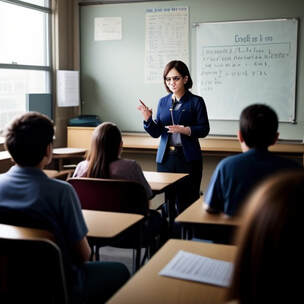 Image generated by ArtBreeder, an AI for making images. Image generated by ArtBreeder, an AI for making images. This time around, I wanted to talk about education with the AI. My roommate is a teacher and has used ChatGPT to create lesson plays and write plays for her students to act out – making a large workload be very minimal. So first, I tried making a lesson plan. I asked it to create a lesson plan to teach grade 12 students the basics of calculus. The AI created this lesson plan fairly quickly and gave great detail into the work needed to be done. It listed the objective, materials needed, proper timeline with dates and breaking down the period into chunks of work including time for students to work alone and together, assessments and reviews, and extensions ideas. This AI really covered everything needed to plan my week of calculus. Then, I asked about the AIs ability to teach. It responded by saying it could definitely teach someone math, including daily lessons, quizzes and personalized feedback that students may not get in the classroom. However, it stated that AI would not be able to replace the human teacher as it has less emotional intelligence and cannot read people like another person is able to. Although I know that AI simply collects data from the internet and gives it to me quickly, it was interesting to see it’s opinions and abilities given the prompts. Overall, as teachers I can see ChatGPT being useful to get things done quickly or to find new ideas to present things in new ways to students, but I fear that it is simply stealing from other people, and not crediting them. If this source is just collecting data form online, how can we know where it is getting this information? I am worried about copying someone without even knowing I am doing so, and that is not fair to the person who put in the work to create these ideas or lesson plans. I do think it is a helpful and interesting tool, but I feel like I need more information to fully trust this new idea. In the future, I think I will rely on my own ideas first and push myself to be creative before I turn to the information provided by an artificial source. 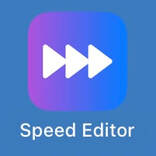 This week I worked on remaking a sweater I had made in the past. The original pattern of this sweater was from a TikTok (that has since been lost in the algorithm, but is similar to this tutorial by @savannah.stitches)I followed over a year ago, but it did not fit me. I made my sweater much too large, it fit my older brother pretty well but it wasn’t his style (LOL)! I wasn’t sure how to fix this sweater, especially because the yarn is not that soft, so I probably would not wear it very often. So, I searched online through YouTube and TikTok and even Google of what to do with my yarn now. I found MANY things I was inspired by, which is good because I have SO MUCH yarn! I specifically liked this book cover by Mahum, however, I wanted mine to look different, it was good for the inspiration! I tried to track my progress very heavily with this project, instead of just doing the beginning and end looks, so I took a lot of pictures and time lapsed the work I was doing! To do this I used iMovie again (first used in my previous post, 'Directing the Classroom') and a video speeder app called “Speed Editor.” I liked this app, but there were a lot of ads and the videos could only be sped up to 2x speed without paying, so I had to put my videos through the editor many times to get them fast enough. Here is my short video of my work!
Cyber presence is an interesting topic for me. On one hand, I think that people need access to the internet to keep up with the modern world, no matter the age or any factors of their personal life. On the other hand, I have concerns about young people having an online presence. Many people when they are young do not understand how the internet works or believe in its’ permanence. I remember when I was young, I posted things thinking they would never be found, or get erased eventually – however they are still there, which is embarrassing.
I worry about people, who do not understand what they are saying, being punished for life because of a mistake or misunderstanding they had when they were very young. For the most part, I like people being held accountable for things they have done in the past. Specifically famous people, I think it is important we entrust people we praise with similar values as our own. That being said, I am aware that many people have different values then my own, so it is impossible to say that one famous persons’ values are all around bad and unagreeable. It's also impossible to take recognition away from a person, if they have an established fame. Similar stories of people like Jeffree Star (online history of racism), J.K Rowling (Openly transphobic), Elon Musk (supporting antisemitic material) and many more. Many celebrities get away with horrible behaviour, despite there being online receipts of these actions. On the other hand, many people who are not making millions are being kicked out of school for past actions of similar manners. Taking away scholarships seems like a just consequence for racist, sexist, queer-phobic or other horrible actions, but I think not being allowed to go the university at all is something I am for, as well as against. I believe schools should allow students with similar beliefs as the school motto to attend the university, however I do not think that people’s actions that are kept online permanently should never be allowed to attend the university. Overall, I am conflicted about cyber presence, and I have a lot of questions. Specifically – how long is long enough to be forgiven for past actions (even when these actions are still online for all to see)? Or maybe a better question is, what can people do to prove they have grown or changed their opinions since their questionable post(s) were made? Also, who is to decide that we, as a group, forgive someone for their past actions? I would assume the people directly harmed by the actions of the perpetrator, but it is not like we can get everyone of a certain group into one big room and all agree on the appropriate actions to be taken surrounding the situation, right? When and who can we forgive, and when should we not forgive? I liked this video below to explain and discuss cancel culture through a more entertaining way than I can type to you guys! Check it out! 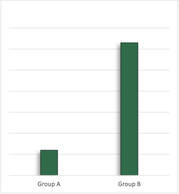 Digital literacy is becoming a huge part of our daily lives, given the social climate of today and our heavy reliance on the internet for information. In the past ten years or so, I have found my own digital literacy to be lacking and worked hard to ensure that any information I am spreading online or in person is fact checked and proven by multiple trusted sources. I hope I have improved this part of my life, however, I feel that I am more scared to “claim” having knowledge of something now than I was before, in fear that I may be misinformed. 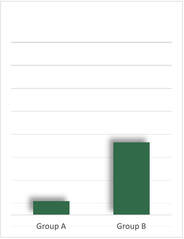 As a future maths teacher, it would maybe not come up very much directly in my classes to deal with fake news or misinformation. But I think there would be opportunities to teach about skewed information, especially in graphs! It is very easy to create a graph of statistics and make it LOOK different than it is. For example, I created these two graphs to the right to show the same information in two different graphs, and how simple it is to skew information or perspectives. People can definitely do a better job than this, especially since a lot of online sources simple lie about the numbers. I also think it’s important to catch students if they are spreading misinformation, or to be able to discuss any questions about topics they may be conflicted about with hearing multiple perspectives. I also thinking, if I am able to teach about it, that I would like to discuss the ‘backfire effect’ within the brain, discussed in this comic called "You're not going to believe what I'm about to tell you". This is the neurological process in which people deny or reject information that goes against their own beliefs because it is hard to accept being wrong on something that believe so deeply. Similarly stated and further explained in “it’s Easier To Call A Fact A Fact When It’s One You Like, Study Finds” by NPR. Also, in the ’10 Types of Fake News’ by PBS, I find it interesting that they labelled propaganda as neutral impact. If we look in the past, specifically in wars or conflicts, I will never consider propaganda as a neutral media. In fact, I think labelling propaganda as neutral is misinformation in itself, as it is not labelling it for what it really is! Giving it a more positive and acceptable view than it deserves. It is not appropriate or acceptable to spread propaganda in my opinion. I would like to teach students about propaganda, and it’s impacts as it seems to be the least noticed media misinformation. Overall, I think media literacy is extremely important in the growing world of today and even more important in our future and the students’ lives that we will be impacting. For this week of learning, I wanted to reflect back on my goals from the beginning of this project. Looking back, I wanted to learn about the crochet language and how to read patterns when there is not tutorial provided. Although I am still working on understanding patterns, I thought it would be a fun to try and make my own pattern for something! A couple of weeks ago, my sister asked me to make her a toque with bunny ears attached, in honour of her best friend who passed away two years ago. I couldn’t find a pattern for something I liked and felt fit what my sister wanted, so I knew I would have to make it up as I go, so this is my pattern I made! For this pattern, I saw two different styles of reading crochet so I wanted to try both. Both come with some base knowledge that I did not include in the images, but I learned online. This resource is great for learning the shorthand for stitches in crochet, and this resource is very helpful for learning the stitch chart style I did for the bunny ears sections! I also wanted to note that I did use a smaller hook than what the yarn called for, to ensure there were less gaps in the toque and it would be warm!
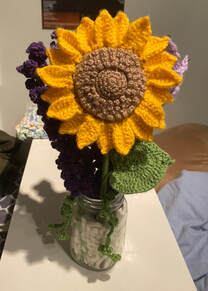 This week I learned a new perspective for making art with crochet. I continued to work on my flower bouquet a bit this week, but I struggled to commit to these crafts as I was worried it wouldn’t pay off in the long run. I kept thinking “if someone just pulls this string, the whole piece will fall apart!”, which kept me unmotivated and uninspired by these thoughts. Until I realized (!!! Big moment for me here!!!) that art is allowed to be fragile! In fact, most art is fragile! I realized this when I was read the quote “Most art is fragile, but some should be placed and never moved” by Donald Judd and I was reminded that people are paid to revarnish famous paintings, or how statues get chipped but are still considered incredible works of art history! I kept holding myself back with these flowers because a lot of it is loose, random and not tied together at every point, making it breakable if you gave it a bit too much love. Or even that these pieces wouldn’t sit the same at all times and would curl, twist, stretch and shrink really bothered me because I felt like my hard work wasn’t showing through this project! 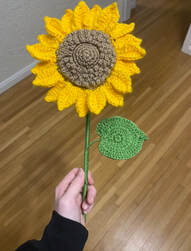 Realizing that art can be fragile and that these pieces don’t need to be bullet proof has really changed my perspective on what I can or should make! I love the look of these flowers, but hated how delicate they were, but now I love the look AND how delicate and fragile they are – like real flowers! Granted these flowers aren’t weak or bad, they’re just a little less structured than a blanket or a toque! I worked on a sunflower mainly this week! The loops for the seeds on the sunflower are delicate and could come out if they were pulled a little too hard, but I think it looks amazing! It was very worth the work, and this realization ahs really opened up my perspective on crochet!
Coding is… hard. I am not the best with technology already, but I find making things with technology is very difficult. Especially because I can’t see what I am doing while I do it, I just have to work out a big chunk of coding and THEN test it out!
I liked Scratch for making this game, as I have used it before. I tried to find this really horrible game I made back in elementary school (the game below!), but I think it got taken down because it was designed to crash computers (whoops!). I did find this game I made at the time as well though, which is not very good! I wanted to make a new game (the game above!), something I didn’t try my first time with Scratch. For this, I chose a Searching game, where you have to find objects and click on them to win the level. However, I could not figure out how to make the game “end” when all objects are clicked – or even do anything after that! I wanted the game to wait until all objects with in the pink box to the left, but it greatly depended on the player doing things in a specific order, which was not feasible to rely on. If you do select the objects in the order: Baseball, Key, Present, Guitar, then the game will move to the end screen, but it won’t move on if they are ‘found’ in any other order, which is annoying but could be my own error. After finishing my game, I think I like Scratch for coding – especially for people who are new to coding. It is simple but doesn’t walk you through it too much so there is still learning that can be done. I also found it good for improving problem solving skills, as you have to find and fix your own errors in the game when they appear – no one is there to know what you’re trying to make the game do! For me, coding has never been super important, and I can see myself going my whole life not really understanding it and being fine, but future generations may rely more on it. With the new technologies coming up every day, the younger generation are much more likely to run into coding in their future lives than I am! Overall, I definitely prefer to play games to making them! |
AuthorMy name is Paige Belcourt and I am currently a student a the University of Regina. I am working towards a degree in Secondary Mathematics Education with a minor in French, as well as a certificate in inclusive Education. Archives
April 2024
Categories |
||||||||||||
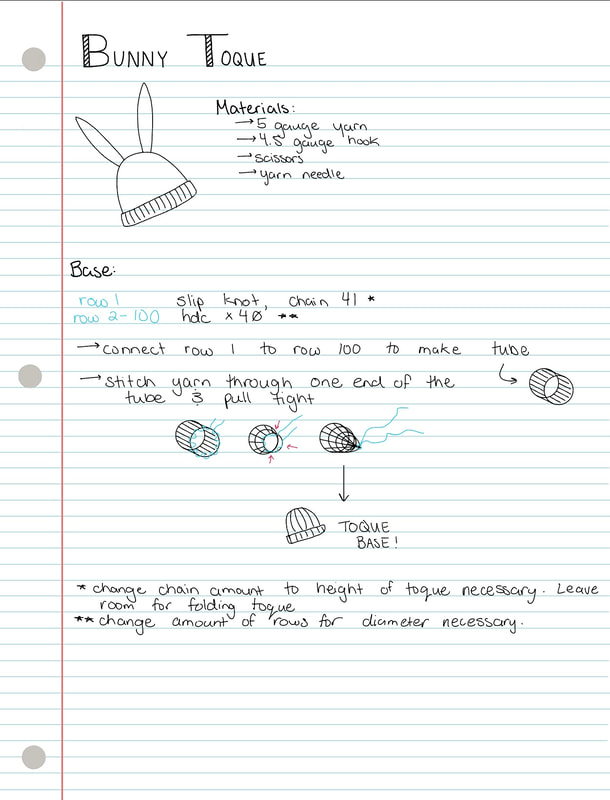
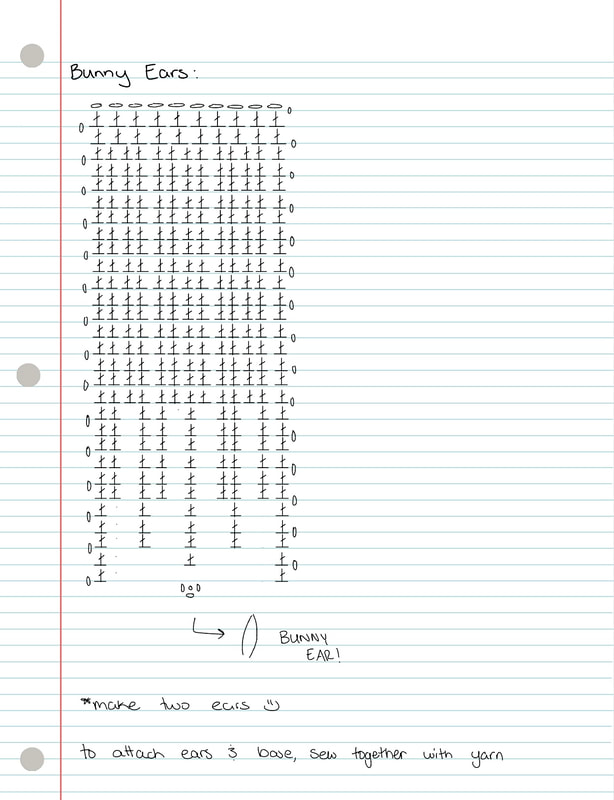
 RSS Feed
RSS Feed
